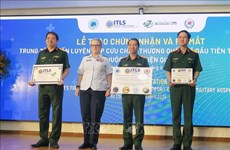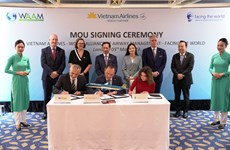Australian scientist shares strategies on dengue elimination
Professor Scott O’Neill, who is the leader of the “Global Eliminate
Dengue Research Programme” and Dean of Science Faculty at Monash
University (Australia), chaired a roundtable and gave a lecture on
dengue elimination at the Hanoi Medical University on June 11.
Professor Scott O’Neill, who is the leader of the “Global Eliminate
Dengue Research Programme” and Dean of Science Faculty at Monash
University (Australia), chaired a roundtable and gave a lecture on
dengue elimination at the Hanoi Medical University on June 11.
According to the professor, the “Global Eliminate Dengue Research Programme” team has discovered that the presence of Wolbachia, a naturally occurring bacterium, within the dengue-carrying mosquito Aedes Aegypti works as a vaccine for the mosquito and lowers its ability to communicate the dengue virus to people.
He said the Wolbachia-based method is a practical and environmentally sensitive approach to suppress dengue fever with the potential for large-scale implementation at low cost and thus is well suited to Vietnam’s ecology.
The research team has worked with Vietnam’s National Institute of Hygiene and Epidemiology and other domestic health organisations in a field trial in Tri Nguyen island in the south-central province of Khanh Hoa, where they released a number of Wolbachia-carrying mosquitos on April 3 this year.
The result of the study is consistent with earlier research projects in Australia and no undesirable side-effect was detected.
Professor O’Neill’s visit is one of the activities to mark the 40th anniversary of diplomatic relations between Vietnam and Australia .
Australian Ambassador to Vietnam Hugh Borrowman said he was happy to see such an effective and meaningful collaboration between the two countries’ scientists in eliminating dengue fever in Vietnam in addition to the excellent cooperation that already exists between Vietnam and Australia in education, trade and investment, and border control.
One day earlier, the Australian scientist made a visit to the Children’s Hospital No. 2, met with the Pasteur Institute leaders and attended a seminar on the same topic in Ho Chi Minh City.-VNA
According to the professor, the “Global Eliminate Dengue Research Programme” team has discovered that the presence of Wolbachia, a naturally occurring bacterium, within the dengue-carrying mosquito Aedes Aegypti works as a vaccine for the mosquito and lowers its ability to communicate the dengue virus to people.
He said the Wolbachia-based method is a practical and environmentally sensitive approach to suppress dengue fever with the potential for large-scale implementation at low cost and thus is well suited to Vietnam’s ecology.
The research team has worked with Vietnam’s National Institute of Hygiene and Epidemiology and other domestic health organisations in a field trial in Tri Nguyen island in the south-central province of Khanh Hoa, where they released a number of Wolbachia-carrying mosquitos on April 3 this year.
The result of the study is consistent with earlier research projects in Australia and no undesirable side-effect was detected.
Professor O’Neill’s visit is one of the activities to mark the 40th anniversary of diplomatic relations between Vietnam and Australia .
Australian Ambassador to Vietnam Hugh Borrowman said he was happy to see such an effective and meaningful collaboration between the two countries’ scientists in eliminating dengue fever in Vietnam in addition to the excellent cooperation that already exists between Vietnam and Australia in education, trade and investment, and border control.
One day earlier, the Australian scientist made a visit to the Children’s Hospital No. 2, met with the Pasteur Institute leaders and attended a seminar on the same topic in Ho Chi Minh City.-VNA













